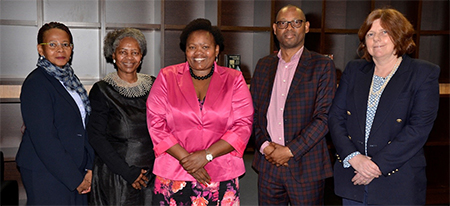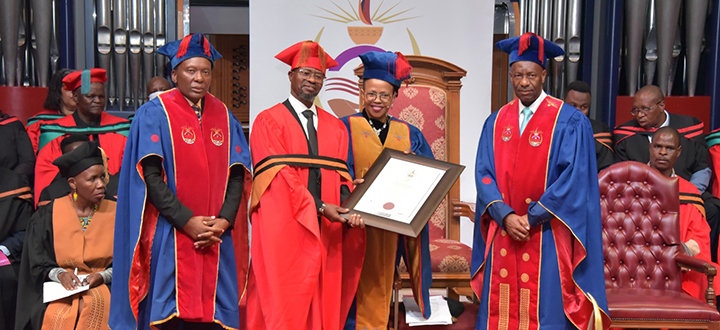College of Human Sciences
Communuty Safety MEC speaks on school health for child protection, safety and security
As a university, Unisa is deeply committed to playing its role in the country’s national development, through the alignment of its core business areas of teaching and learning, research, and community engagement with national educational and developmental objectives.

Pictured are Dr Faith Kumalo (Department of Basic Education’s Chief Director for Care and Support in Schools); Prof Olga Makhubela-Nkondo (Coordinator of the Unisa School Health Improvement Programme in the Department of Health Studies, College of Human Sciences); Sizakele Nkosi-Malobane (Gauteng MEC Community Safety); Prof SK Ndlovu; and Prof Lesley Bamford (National Department of Health’s representative).
For this reason, the College of Human Sciences has institutionalised the School Health Integration Programme (SHIP), a community engagement project that addresses the overall health needs of learners in schools in an effort to elevate them to perform and function at their peak with their daily academic activities. Aligning community service is a core function of the university; SHIP envisages synchronisation of health, and educational interests of all learners to ensure that Unisa’s future students are drug, alcohol and HIV-free.
Prof Olga Makhubela-Nkondo (Coordinator of SHIP which is housed in the Department of Health Studies, College of Human Sciences) said we need to imagine a South Africa where learners reach university without having ever been tempted to smoke, abuse illicit substances and/or alcohol, having gone through unplanned pregnancies or without suffering from preventable diseases.”
She was speaking following Unisa’s 7th Annual School Health Convention held on 30 July 2018. The Gauteng Community Safety MEC Sizakele Nkosi-Malobane delivered the keynote address speaking on school health for child protection, safety and security. She cautioned school health practitioners, educators, social workers, psychologists, parents, activists, policy-makers, academics, students and community representatives to be alert to signs and other evidence of obvious learner risk.
Also attending the convention was the Department of Basic Education’s Chief Director for Care and Support in Schools, Dr Faith Kumalo who oversees the development, implementation and monitoring of Care and Support programmes in the schooling sector. Dr.Kumalo’s vast experience in health, nutrition, and care and support programmes in the schooling sector spans over 20 years. She emphasised the importance of protecting the girl and boy child, stating that the boy child should not be neglected as he needs as much protection as the girl child. Dr Kumalo stressed the importance of schooling as preventive to teenage pregnancy and diseases.
The National Department of Health’s representative was Professor Lesley Bamford. The pediatrician underscored that the Integrated School Health Programme provides a unique opportunity for every learner to interact with health practitioners in the school context.
Lebohang Nthongoa, author of Nothing Ones shared her publication to raise public awareness and summon community support for the protection, safety and security of all persons in particular the plight of the learner with albinism as she shared the poem with the audience who described the entire experience as factual revelation.
Professor Fhumulani Mavis Mulaudzi, Head of Health Sciences at the University of Pretoria motioned delegates to embrace community mobilisation for each home and encouraged the community to protect each and every child.
Dr. Itumeleng Seane, Senior Medical Officer in the City of Tshwane said: “The children and youth are the future”. Supporting the Minister of Health’s aspiration that it is possible for learners to advance: “…without smoking, without been abused, without trying and experimenting with illicit substances and/or alcohol, without unplanned pregnancies or without suffering from preventable diseases”. Seane said this vision can be achieved.
“We the village must work together in a mutually beneficial relationship (child, parent, families, teachers, health professionals, health facilities, school management, School Health Programme). All the community based organisations, various fora, such as men’s forum, women’s organisations; including, faith based organisations, social workers, activists and sports’ organisations, ought to come together to protect the children, and root-out the social ills. Professionals should do what they are expected, and obliged to do, within the parameters of the law, and be sensitive to the fact that this is about the child, and doing what is in the best interest of the child.”
Dr Christine Laidlaw, clinical psychologist guided delegates on the importance of practitioner obligation to report any signs of child susceptibility with or without parental consent.
Yanga Ntatiso, the administrative officer at Y’imani shared knowledge, processes and tools for financial literacy. Financial consciousness she said is aimed at sensitising the community. More importantly, it is necessary to provide skills that could assist in preventing and reducing debt. This is necessary especially where the girl-child is concerned to obviate risks of over-dependence on the so-called “blessers”. By working with communities; most importantly, the interactions with the Integrated School Health Programme task team it is hoped that financial literacy will provide unlimited potential for a drug-free, disease-free, pregnant-free bright future among South Africa children and youth.
* Written by Professor Olga Makhubela-Nkondo (Coordinator of the Unisa School Health Improvement Programme in the Department of Health Studies, College of Human Sciences)
Publish date: 2018-09-03 00:00:00.0

 Young Unisa doctoral graduate joins elite Lindau Nobel Laureate group
Young Unisa doctoral graduate joins elite Lindau Nobel Laureate group
 Education MEC addresses Unisa autism seminar
Education MEC addresses Unisa autism seminar
 Seven Unisans nominated for the NSTF-South32 Awards 2023/2024
Seven Unisans nominated for the NSTF-South32 Awards 2023/2024
 Unisa awards posthumous honorary doctorate to literary maven, OK Matsepe
Unisa awards posthumous honorary doctorate to literary maven, OK Matsepe
 From humble beginnings to academic leadership
From humble beginnings to academic leadership